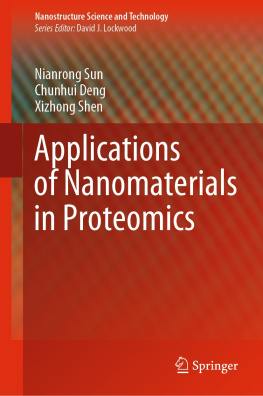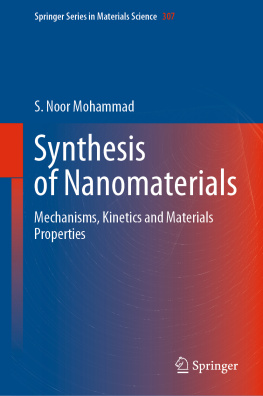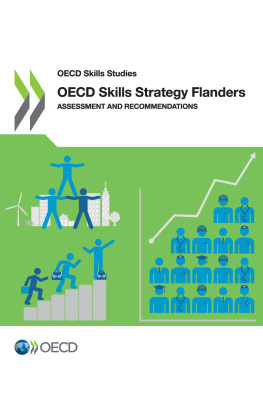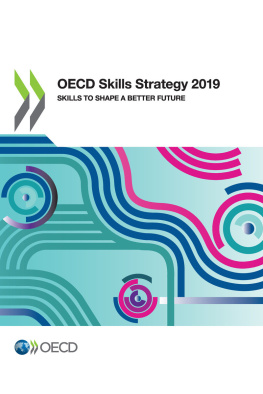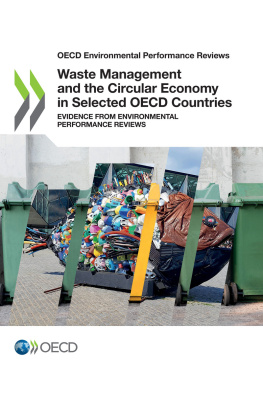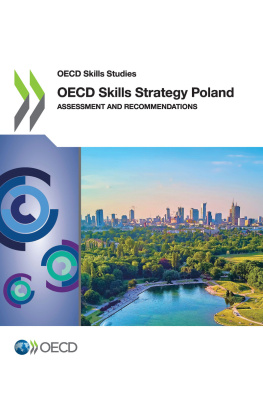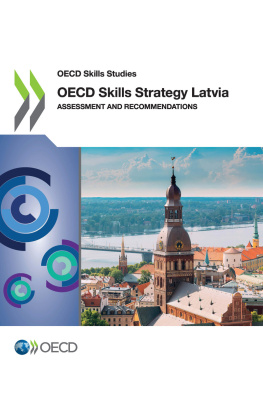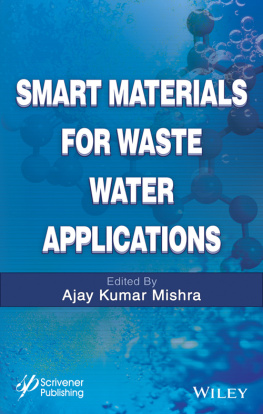OECD - Nanomaterials in Waste Streams
Here you can read online OECD - Nanomaterials in Waste Streams full text of the book (entire story) in english for free. Download pdf and epub, get meaning, cover and reviews about this ebook. year: 2016, publisher: OECD Publishing, genre: Romance novel. Description of the work, (preface) as well as reviews are available. Best literature library LitArk.com created for fans of good reading and offers a wide selection of genres:
Romance novel
Science fiction
Adventure
Detective
Science
History
Home and family
Prose
Art
Politics
Computer
Non-fiction
Religion
Business
Children
Humor
Choose a favorite category and find really read worthwhile books. Enjoy immersion in the world of imagination, feel the emotions of the characters or learn something new for yourself, make an fascinating discovery.

- Book:Nanomaterials in Waste Streams
- Author:
- Publisher:OECD Publishing
- Genre:
- Year:2016
- Rating:4 / 5
- Favourites:Add to favourites
- Your mark:
- 80
- 1
- 2
- 3
- 4
- 5
Nanomaterials in Waste Streams: summary, description and annotation
We offer to read an annotation, description, summary or preface (depends on what the author of the book "Nanomaterials in Waste Streams" wrote himself). If you haven't found the necessary information about the book — write in the comments, we will try to find it.
OECD: author's other books
Who wrote Nanomaterials in Waste Streams? Find out the surname, the name of the author of the book and a list of all author's works by series.
Nanomaterials in Waste Streams — read online for free the complete book (whole text) full work
Below is the text of the book, divided by pages. System saving the place of the last page read, allows you to conveniently read the book "Nanomaterials in Waste Streams" online for free, without having to search again every time where you left off. Put a bookmark, and you can go to the page where you finished reading at any time.
Font size:
Interval:
Bookmark:
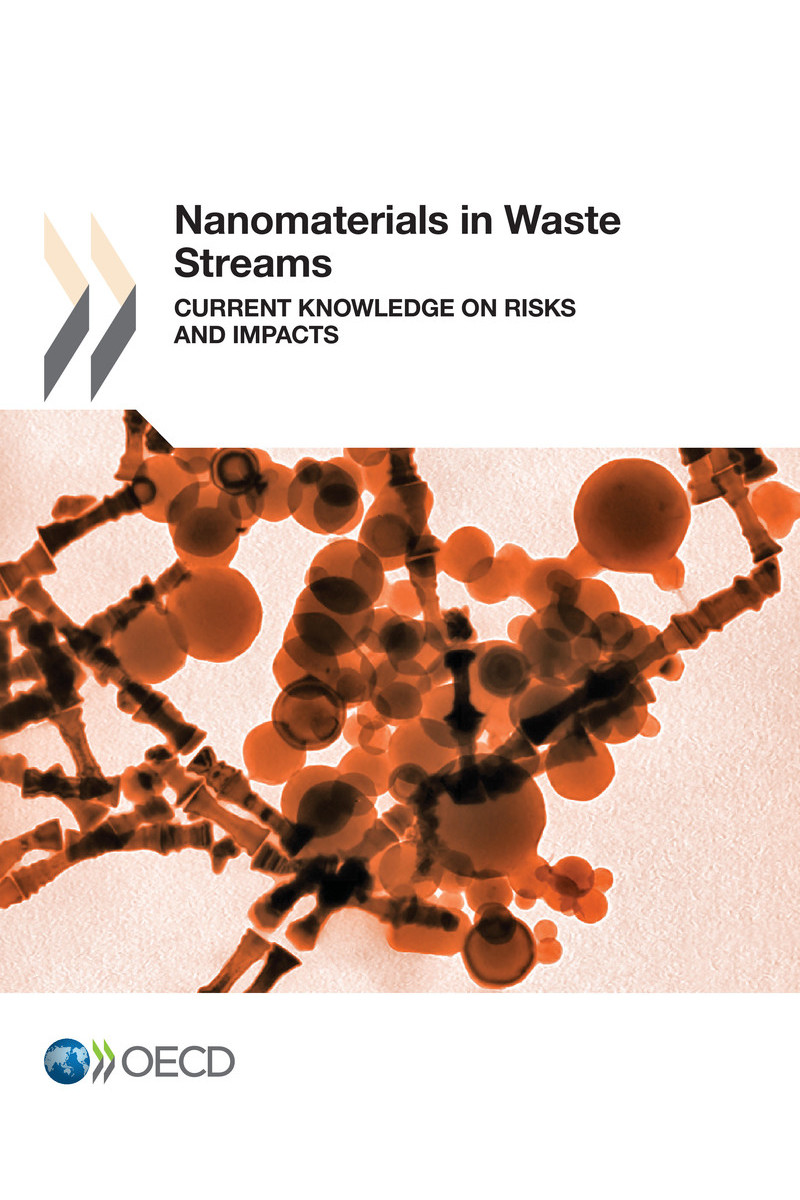
Flicitations et merci davoir tlcharg lun de nos tout nouveaux ePub en version bta.
Nous exprimentons ce nouveau format pour nos publications. En effet, mme si lePub est formidable pour des livres composs de texte linaire, le lecteur peut tre confront quelques dysfonctionnements avec les publications comportant des tableaux et des graphiques tout dpend du type de support de lecture que vous utilisez.
Afin de profiter dune exprience de lecture optimale, nous vous recommandons :
- Dutiliser la dernire version du systme dexploitation de votre support de lecture.
- De lire en orientation portrait.
- De rduire la taille de caractres si les tableaux en grand format sont difficiles lire.
Comme ce format est encore en version bta, nous aimerions recevoir vos impressions et remarques sur votre exprience de lecture, bonne ou autre, pour que nous puissions lamliorer lavenir. Dans votre message, merci de bien vouloir nous indiquer prcisment quel appareil et quel systme dexploitation vous avez utilis ainsi que le titre de la publication concerne. Vous pouvez adresser vos remarques ladresse suivante :
Merci !
Congratulations and thank-you for downloading one of our brand-new ePub-in-beta editions.
We're experimenting with this new format and, while ePub is fantastic for books with linear text, for books with charts, tables and graphs weve found some things may not work perfectly it depends on the device youre using.
So, for an optimal reading experience, we recommend:
- Using the latest version of your devices operating system.
- Reading in portrait mode.
- If large tables are tricky to read, try reducing the text size.
As this is an ePub-in-beta edition, we would be glad to receive feedback on your reading experience, good or otherwise, so we can improve for the future. When writing, please let us know which device/operating system you were using and the title of the publication. Write to:
Thank you!
OECD (2016), Nanomaterials in Waste Streams: Current Knowledge on Risks and Impacts, OECD Publishing, Paris, http://dx.doi.org/10.1787/9789264249752-en.

Improving themanagement of materials and sharply reducing the impact of waste are key elements in any strategy tohalt the on-going erosion of environmental resilience. This means policies and approaches thatencourage the sustainable use of materials and ensure human health and environmental protection. Anysuch policies need to adapt to the rapidly changing manufacturing environment associated withtechnological and process innovations. One such innovation is the increasingly widespread use ofengineered nanomaterials.
Nanomaterialsare increasingly used in a variety of widely available products such as sunscreen, cosmetics,antibacterial textiles, lithium ion batteries, glass coating and tennis rackets. Nanomaterials areutilised in a range of applications due to their significantly enhanced properties, enabled by theirnano-scale structure. However, these special chemical and physical characteristics are alsoassociated with possible risks to environmental health and safety. A relative blank spot inscientific understanding lies in the area of waste management. Waste containing these materials iscurrently managed along with conventional waste without sufficient knowledge of the associated risksand impacts on the environment.
This reportaims to provide an overview of the current state of scientific insights in this area, as well as theknowledge gaps. It investigates the literature on the fate and possible impacts of nanomaterials inspecific waste treatment processes, including recycling, incineration, landfilling and wastewatertreatment processes. It also highlights key messages, future research areas and possible approachesto effectively support the sustainable management of nanomaterials.
The reportdraws on knowledge generated within the OECD and beyond. The development of the report has been ledby the Working Party on Resource Productivity and Waste (WPRPW) in close collaboration with theWorking Party on Manufactured Nanomaterials (WPMN). The science in this area is rapidly evolving andthe OECD is planning to pursue its efforts in this area in close co-operation with otherorganisations at the international and national level, including governments, research institutes,and academic circles.

SimonUpton
Director
OECDEnvironment Directorate
Thispublication has been developed by OECDs Environmental Policy Committee through its Working Party onResource Productivity and Waste (WPRPW). The individual chapters on recycling, incineration,landfilling and wastewater treatment have been developed by technical experts from Switzerland,Germany, Canada and France. At the OECD Secretariat the project was co-ordinated by Peter Brkey andShunta Yamaguchi under the supervision of Shardul Agrawala, Head of the Environment and EconomyIntegration Division.
This work wasinitiated to attract attention to the potential risks that are linked to the presence ofnanomaterials in waste treatment processes. As a first step, a Scoping Study onNanowaste was developed by Jeremy Allan in May 2012 followed by a workshop onSafe Management of Nanowaste held in Munich on9 th -11 th May 2012. This workshop contributed to identifying the state ofknowledge in this area and led to the development of four reports on specific waste treatmentprocesses of recycling, incineration, landfilling and wastewater treatment, which are presented inthis publication.
Font size:
Interval:
Bookmark:
Similar books «Nanomaterials in Waste Streams»
Look at similar books to Nanomaterials in Waste Streams. We have selected literature similar in name and meaning in the hope of providing readers with more options to find new, interesting, not yet read works.
Discussion, reviews of the book Nanomaterials in Waste Streams and just readers' own opinions. Leave your comments, write what you think about the work, its meaning or the main characters. Specify what exactly you liked and what you didn't like, and why you think so.







